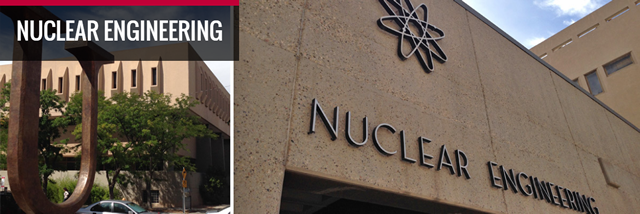
Nuclear Engineering ETDs
Publication Date
Summer 7-15-2019
Abstract
The Critical Heat Flux (CHF) causes a rapid reduction of heat transfer coefficient with a rapid increase of cladding temperature, which may induce physical failure of the heated material. Understanding CHF phenomena and reliable prediction of the boiling behavior are needed to design a heat transfer system including nuclear reactors. Due to the complex nature of CHF, it is still an active research topic of interest. With an increasing interest in Accident Tolerant Fuel (ATF), CHF of ATF is essential topic of study for the detailed design of the fuel – cladding element and for the reactor safety analysis.
In this study, flow boiling experiments were conducted at atmospheric pressure with deionized water in an internal-tubular channel with a uniformly heated surface. With this heat flux controlled system, steady-state and transient CHF experiments were performed to gain a mechanistic understanding of the boiling nature. The experiments were conducted under the following conditions: (1) mass flux, G of 200 - 2000, (2) inlet subcooling of 54, 34, and 10, (3) atmospheric pressure of 84 kPa. Experiments at low mass flux were repeated on the same specimen to observe the effect of the surface characteristic change on CHF. Despite the notable changes in surface wettability and roughness, change in flow CHF was not observed, which implies the limited significance of surface characteristic on CHF under flow condition. To mechanistically understand observed CHF differences among the tested materials, material thermal parameters were considered. In addition, a statistical approach was made to analyze CHF differences among the tested materials covering a wide range of mass flow rate, which demonstrated a reducing relative CHF differences with increasing mass flow rate. It implies limited significance of material-sensitivity for the design of fuel and cladding and steady-state safety. Yet, observed CHF differences at low mass flux require a more detailed thermal-hydraulic material-sensitivity study at it may play an immense role under the accident scenarios where mass flow is limited. Lastly, transient boiling CHF experiments were carried out to enhance cladding behavior with a pulsed power insertion under flow condition. With measurable values from the transient boiling experiments, boiling curve construction method is presented.
Keywords
Flow Boiling, Critical Heat Flux, Accident Tolerant Fuel, Steady-state CHF, Transient CHF, FeCrAl
Sponsors
Department of Energy
Document Type
Dissertation
Language
English
Degree Name
Nuclear Engineering
Level of Degree
Masters
Department Name
Nuclear Engineering
First Committee Member (Chair)
Anil Prinja
Second Committee Member
Youho Lee
Third Committee Member
Amir Ali
Fourth Committee Member
Nicholas Brown
Recommended Citation
Lee, Soon Kyu. "Experimental Investigation of Steady-state and Transient Flow Boiling Critical Heat Flux." (2019). https://digitalrepository.unm.edu/ne_etds/86
